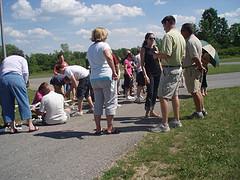 Finally, the author raises, which Organizational Learning everything happens first as a learning process, and then integrated into a gestalt of the group. For its part Senge (1992), led to a theory of Organizational Learning, by relating the current humanistic management, general systems theory and information theory. He defines learning organizations as a social activity where knowledge and skills are implemented, they are criticized and are integrated as opportunities to optimize learning and effectiveness in the workplace. At the same time raises, that the learning organization people can not stop learning because learning is part of the fabric of everyday life.
Finally, the author raises, which Organizational Learning everything happens first as a learning process, and then integrated into a gestalt of the group. For its part Senge (1992), led to a theory of Organizational Learning, by relating the current humanistic management, general systems theory and information theory. He defines learning organizations as a social activity where knowledge and skills are implemented, they are criticized and are integrated as opportunities to optimize learning and effectiveness in the workplace. At the same time raises, that the learning organization people can not stop learning because learning is part of the fabric of everyday life.
In the learning organization, people enhance their ability to create what they want to create and have an ingrained philosophy for anticipating, reacting, and responding to change, complexity and uncertainty. In this way it is interpreted that the proportion to the speed at which organizations learn may become a sustainable source of competitive advantage. It raised before we can say that learning organizations are those that facilitate the learning of all its members and to continually transform to meet the demands of the environment. The key is to understand the learning as inseparable from everyday work to create spaces in which to address the problems, clarify differences, creating a sense of belonging, ownership of goals and institutional objectives. Senge (2000), focuses the study of organizational learning, in terms of its ontological dimension, at the organizational level, transcending the individual and the group. This article highlights his view of learning in organizations in a systemic perspective, considering that the key to an organization to learn, lies in the overall understanding of it and the interactions among its parts.